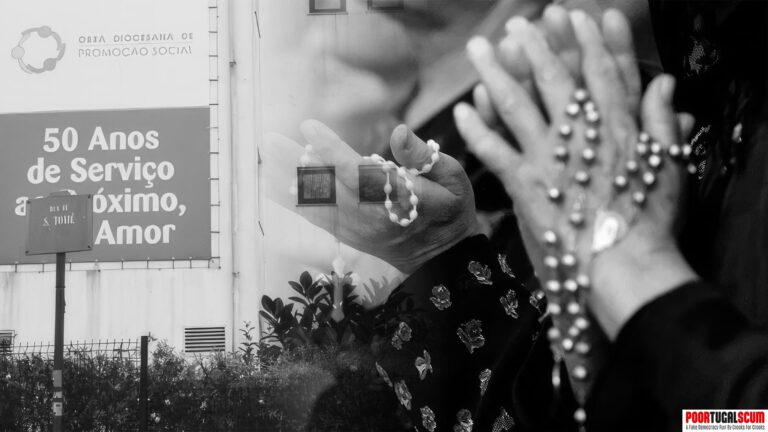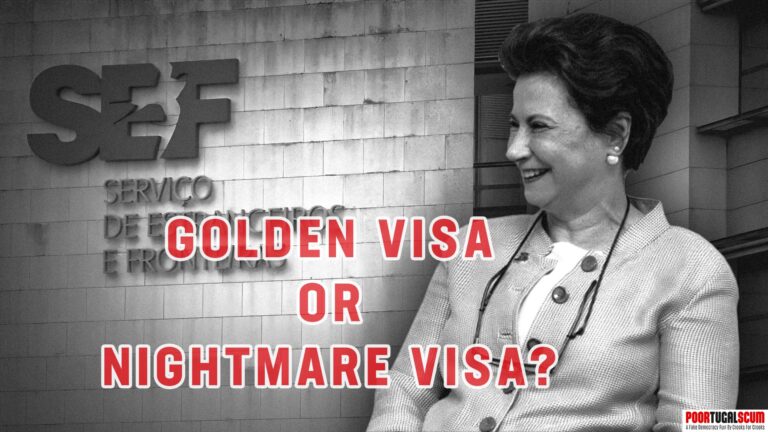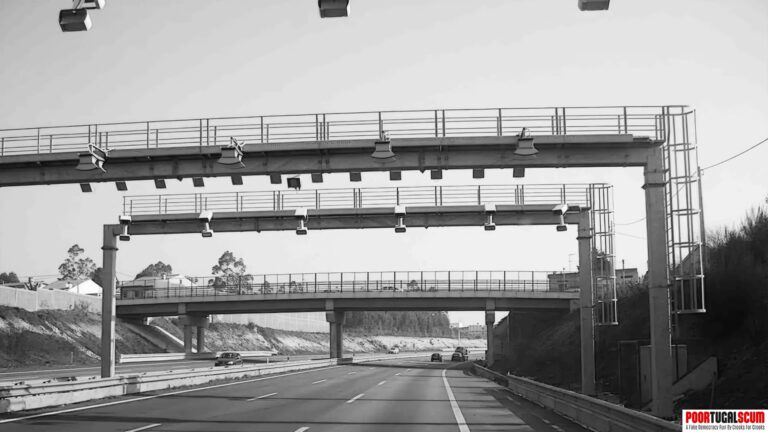The public company Parque Escolar (PE) authorized illegal expenses and payments of (at least) 492 million euros, since they had not been previously remitted and audited by the Court of Auditors (TC), although the public company is obliged to do so.
And that’s not all: “Illegal expenses amount to 487.9 thousand euros, BUT illegal payments amount to another 344.8 thousand euros”. So it is an endless list of “illegalities”, under the most diverse pretexts, in which millions of public funds are “spent” as if they were cents.
Then comes the extraordinary penalty to which those responsible may be subject: let’s see, managers can be fined in accordance with the law, at least half of their monthly net salary and as a maximum limit, half of their annual net salary. (!!!)
Isn’t Portugal an extraordinary country? Millions and billions of euros are stolen and the punishment is to pay a fine, proportional to the salary of course! And that’s it! But it gets even better, in the end these poor souls only had to pay back the modest sum of 2200 euros! Yes, you read that right!
Not bad at all! 500 million Euros (at least) of taxpayers’ money was stolen and then ONLY 2200 Euros was returned! Do the math!
The following article is a translation (mostly MT). You can find the link to the original website at the end of it.
Court of Auditors will sue managers financially for not sending contracts to the entity
The Court of Auditors (TC) report on Parque Escolar (PE) says that between February 2007 and March 2009 the company authorized illegal expenses and payments of 492 million euros because they had not been remitted to the TC, despite, according to the entity led by Oliveira Martins, the company is obliged to do so.
Thus, the TC states that “illegal expenses and payments were made in the amount of 256 million euros and 236 million euros, respectively, due to the PE’s failure to submit 34 contracts for contract and acquisition and leasing of goods and services concluded in the period between the creation of the PE in February 2007 and March 2009”.
Furthermore, the TC identified another situation, “in the rental of prefabricated monoblocks for the temporary installation of classrooms in schools in Lot 1 of Phase 1 [of the school modernization and requalification program], for a value considerably higher than the base price, following the conversion of an international public tender procedure into a negotiation procedure.
Illegal expenses amount to 487.9 thousand euros, and illegal payments amount to 344.8 thousand euros”.
The TC also found illegalities in the adoption of the urgent public tender by the company (13.8 million in expenses and 13.5 million in illegal payments) and in the splitting of expenses (12.1 million in expenses and 11.9 million in payments)
The TC says that this action, by the Board of Directors of Parque Escolar, which has since resigned, is likely to “determine possible sanctioning financial liability, under the provisions of paragraph h) of paragraph 1 of art. 65th of the LOPTC [Law on Organization and Procedure of the Court of Auditors]”.
In other words, managers can be fined in accordance with the provisions of this law, at least half of their monthly net salary and, as a maximum limit, half of their annual net salary.
The TC identifies the five administrators who authorized the payments: João Sintra Nunes (president), Teresa Valsassina Heitor, José Domingues dos Reis, Gerardo Saraiva de Menezes and Paulo Grilo Farinha as well as the amounts authorized by each one. Sintra Nunes authorized the most amounts that the TC considers illegal.
The PE claimed in a contradictory statement cited by the TC that, given its purpose, it would not be subject to the rules of prior inspection. The organization led by Oliveira Martins disagrees.
The report also recalls that the company’s initial budget was 940 million euros for 332 schools, but was revised to 3.16 billion for 205 schools included in Phases 0 to 3.
The TC also says that “for remaining 120 schools, and considering the average amount of investment, per school, from Phases 0 to 3, of 15.5 million and around 1.86 billion more would be needed, which would total 5.121 billion euros for the entire program.
More related news
Parque Escolar refuses to pay debts
Two courts ruled, but Parque Escolar refuses to pay dramatic debts.
In total, this public company owes three million euros to the consortium that built and modernized the secondary schools in Baião and Amarante.
The judges determined that Parque Escolar should pay the consortium a total of more than 2.6 million euros. Added to this was the decision of a second court, which ruled in favor of the consortium, when it decided to terminate the contract and no longer build the third phase of Amarante.
One of the companies is on the verge of insolvency. The other has already gone bankrupt and the owner committed suicide.
More related news
Parque Escolar’s debt approaches one billion euros
The last loan was in 2010. Today, the total debt amounts to 996 million euros and the government will now pay 242 million in capital and interest, relating to the program that
“was a great party for the country”.
The school rehabilitation program that former Minister of Education Maria de Lurdes Rodrigues said was “a great party for the country” has an accumulated debt of 996 million euros,
according to Diário Económico. The State is preparing to pay 242 million euros (related to capital and interest) from Parque Escolar, a company that has not issued loans since 2010, paying off part of the debt to the European Investment Bank (EIB) and the Council of Europe Bank ( CEB).
Parque Escolar’s debt to these international institutions will only be fully paid off in 2030. At its highest point, according to the Court of Auditors, the debt reached 1,150 million euros – plus interest. Last week, the government approved 340 million euros for Parque Escolar, 242 million of which will already be used to repay capital and pay interest on these loans.
It was during Nuno Crato’s mandate that the debts of Parque Escolar, a public company created in 2007 by the Ministry of Maria de Lurdes Rodrigues, became known to requalify primary and secondary schools. In the audit carried out by the General Inspectorate of Finance, it was found that the company invested 1.4 billion euros to requalify 103 schools,
a slippage of almost 400% compared to the initially budgeted values.
The savings measures introduced by the previous Government limited spending (around 64 million on 72 works), according to Diário Económico.
More related news
Former Parque Escolar administrators free from 500 thousand euros in fines
Sintra Nunes, Teresa Heitor and Domingos dos Reis, acquitted of undue payments, will pay just 2200 euros
The Court of Auditors (TC) acquitted three former administrators of Parque Escolar – João Sintra Nunes, Teresa Heitor and José Domingos dos Reis – of accusations of undue payments made within the scope of works carried out by the company in secondary schools, DN learned.
At issue were fines for reintegrative financial infractions which, if convicted, would mean that, between them, the three would have to pay more than 500 thousand euros to the State. The decision, unanimous and taken in a plenary session, followed an appeal presented by the three former administrators.
On the same occasion, Sintra Nunes, Teresa Heitor and Domingos dos Reis had their convictions confirmed, due to negligence, for sanctioning financial infractions. Namely infractions provided for in article 65 of the Court of Auditors Organization and Procedure Law (LOPTC). More specifically with regard to “violation of the rules on the preparation and execution of budgets, as well as the assumption, authorization or payment of public expenses or commitments”. But these fines amounted to 2208 euros for each applicant.
Any conviction for undue payments would have much more serious consequences, because in practice it would force them to assume the restitution of amounts unduly paid by Parque Escolar.
“You will never pay moral damages”
Questioned by DN, the Court of Auditors only confirmed the existence of a decision on this matter, refusing to comment on its details. “The appeal was the subject of a decision, which is in the notification phase to interested parties”, he explained.
João Sintra Nunes, who presided over the company between 2007 and 2012 and was one of the main targets, told DN that he had not yet received notification of the acquittal on the issue of undue payments. But he considered this to be the right decision. “The only comment I can make is that the decision is fair. Basically, it is the restoration of justice”, he said, leaving, however, an outburst: “But he will never pay for the moral damage that this caused to people.”
Sintra Nunes left the direction of Parque Escolar in March 2012, at a time when the then Minister of Education, Nuno Crato, openly criticized his management’s accounts. In November 2011, the DN had already advanced the ministry’s decision to freeze new works at Parque Escolar and to ask the General Inspectorate of Finance for a financial audit with a technical and administrative component to the company. Both the inspection and the Court of Auditors would later point out several irregularities in the management of the company’s accounts.
Multimillion-dollar charges
At the time, 103 schools were undergoing intervention and work was taking place in another 72 – out of a planned total of more than 330. Parque Escolar’s debt, essentially with the European Investment Bank, had already reached 946 million euros, with a global plan of investments that – if fully executed – would have totaled 3.2 billion by 2015.
The predominance of Mota-Engil in the first phases of the project and several direct award awards to a group of architectural firms were highly publicized topics. Such as apparent eccentricities, such as the installation in a secondary school of a set of lamps designed by Siza Vieira, which cost 20 thousand euros, in addition to oversized air conditioning systems in several schools, which resulted in difficulties for them to pay electricity costs .
( … )









